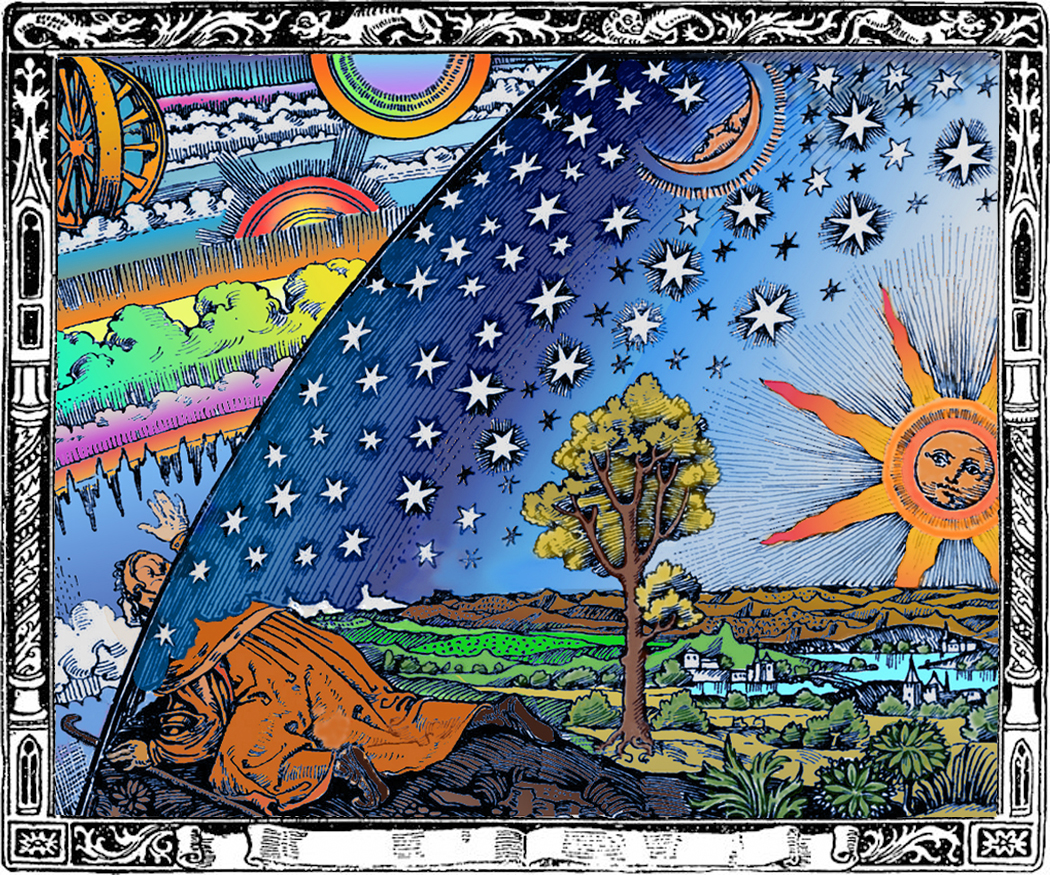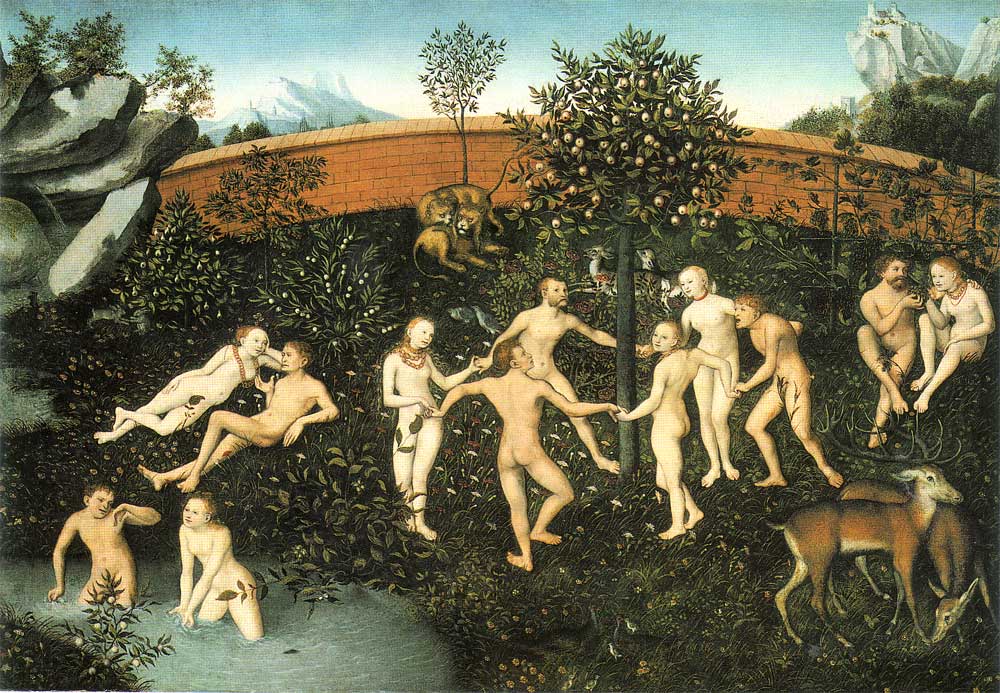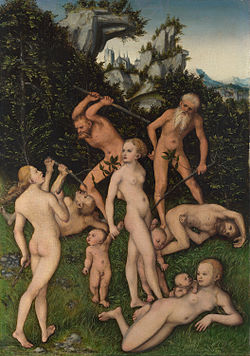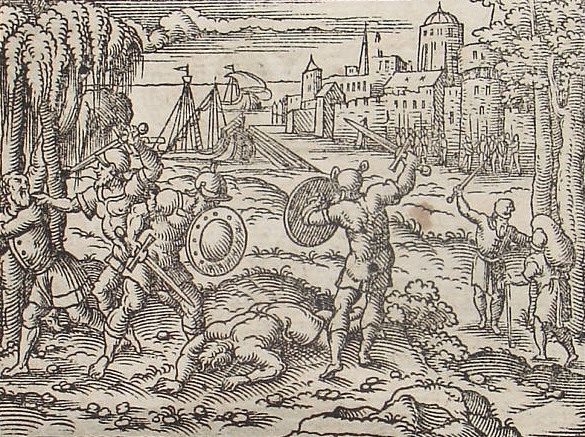It looks like you're using an Ad Blocker.
Please white-list or disable AboveTopSecret.com in your ad-blocking tool.
Thank you.
Some features of ATS will be disabled while you continue to use an ad-blocker.
share:

The Ages of Man are the stages of human existence on the Earth according to Greek mythology.
Both Hesiod and Ovid offered accounts of the successive ages of humanity, which tend to progress from an original, long-gone age in which humans enjoyed a nearly divine existence to the current age of the writer, in which humans are beset by innumerable pains and evils. In the two accounts that survive from ancient Greece and Rome, this degradation of the human condition over time is indicated symbolically with metals of successively decreasing value.
Golden Age – The Golden Age is the only age that falls within the rule of Cronus. Created by the immortals who live on Olympus, these humans were said to live among the gods, and freely mingled with them. Peace and harmony prevailed during this age. Humans did not have to work to feed themselves, for the earth provided food in abundance. They lived to a very old age but with a youthful appearance and eventually died peacefully. Their spirits live on as "guardians". Plato in Cratylus (397e) recounts the golden race of men who came first. He clarifies that Hesiod did not mean men literally made of gold, but good and noble. He describes these men as daemons upon the earth. Since δαίμονες (daimones) is derived from δαήμονες (daēmones, meaning knowing or wise), they are beneficent, preventing ills, and guardians of mortals.
Silver Age – The Silver Age and every age that follows fall within the rule of Cronus' successor and son, Zeus. Men in the Silver age lived for one hundred years under the dominion of their mothers. They lived only a short time as grown adults, and spent that time in strife with one another. During this Age men refused to worship the gods and Zeus destroyed them for their impiety. After death, humans of this age became "blessed spirits" of the underworld.
Bronze Age – Men of the Bronze Age were hardened and tough, as war was their purpose and passion. Zeus created these humans out of the ash tree. Their armor was forged of bronze, as were their homes, and tools. The men of this Age were undone by their own violent ways and left no named spirits; instead, they dwell in the "dank house of Hades". This Age came to an end with the flood of Deucalion.
Heroic Age – The Heroic Age is the one age that does not correspond with any metal. It is also the only age that improves upon the age it follows. In this period men lived with noble demigods and heroes. It was the heroes of this Age who fought at Thebes and Troy. This race of humans died and went to Elysium.
Iron Age – During this age humans live an existence of toil and misery. Children dishonor their parents, brother fights with brother and the social contract between guest and host (xenia) is forgotten. During this age might makes right, and bad men use lies to be thought good. At the height of this age, humans no longer feel shame or indignation at wrongdoing; babies will be born with gray hair and the gods will have completely forsaken humanity: "there will be no help against evil."
I'd be really interested in seeing the OPs own thoughts on this as well as seeing the source(s) of the presented material; otherwise I'm just going to
be a churlish bastard and say that we have progressed quite a bit since the understanding presented in the OP.
I was 23 once...
I was 23 once...
a reply to: aorAki
Lol. Yeah I remember reading Lewis Spence and Bullfinch's Mythology at a similar age and being full of ideas. There's a cosmology chapter in Spence's Introduction to Mythology that shows umpteen different genesis concepts. If anything, it shows that we've been making up stories to explain the unknown for millennia.
The ages of man idea reminds me of the Theosophist beliefs in several ages of life going back to Pangea. It goes to show that ignorance wasn't confined to classical antiquity, eh?
Lol. Yeah I remember reading Lewis Spence and Bullfinch's Mythology at a similar age and being full of ideas. There's a cosmology chapter in Spence's Introduction to Mythology that shows umpteen different genesis concepts. If anything, it shows that we've been making up stories to explain the unknown for millennia.
The ages of man idea reminds me of the Theosophist beliefs in several ages of life going back to Pangea. It goes to show that ignorance wasn't confined to classical antiquity, eh?
a reply to: aorAki
My own thoughts: We are in the golden age
Source: Ages of man - Wikipedia
Conclusion, im interested in your thoughts not mine =)
My own thoughts: We are in the golden age
Source: Ages of man - Wikipedia
Conclusion, im interested in your thoughts not mine =)
edit on 8-8-2015 by yulka because: (no reason given)
I honestly thought the bronze age was literally when we figured out how to make bronze, you know, like iron age = iron etc.....DOH!
a reply to: Kandinsky
Is it this book ?
Spencers book
There's a cosmology chapter in Spence's Introduction to Mythology that shows umpteen different genesis concepts.
Is it this book ?
Spencers book
a reply to: yulka
Looks like it. Give me two minutes and I'll link a free copy....
ETA - Here's a good version from Gutenberg.
This is the chapter I was referencing > THE MAKING OF THE WORLD AND OF MAN (COSMOGONY)
And here's a lovely-looking pdf copy from Cornell University.
Looks like it. Give me two minutes and I'll link a free copy....
ETA - Here's a good version from Gutenberg.
This is the chapter I was referencing > THE MAKING OF THE WORLD AND OF MAN (COSMOGONY)
And here's a lovely-looking pdf copy from Cornell University.
edit on 8.8.2015 by Kandinsky because: (no reason given)
a reply to: zardust
I know, i saw this fantastic movie called "Bom yeoreum gaeul gyeoul geurigo bom", In english Spring, "Summer, Fall, Winter... and Spring"
On an isolated lake, an old monk lives on a small floating temple. The wise master has also a young boy with him who learns to become a monk. And we watch as seasons and years pass by. IMDB
I know, i saw this fantastic movie called "Bom yeoreum gaeul gyeoul geurigo bom", In english Spring, "Summer, Fall, Winter... and Spring"
On an isolated lake, an old monk lives on a small floating temple. The wise master has also a young boy with him who learns to become a monk. And we watch as seasons and years pass by. IMDB
a reply to: yulka
Just to help clarify some, as other users seem to be getting confused, the Gold, Silver, Bronze, Heroic, and Iron Ages, according to Greek mythology, do not correspond to the archaeological method of dating, which are the Stone, Bronze, and Iron Age. The archaeological Ages describes the qualities of civilization, based on advancements in metallurgy, writing, and urbanization. The mythologicl Ages describe the quality of human beings, based on the level of purity or corruption present in their nature.
As for the purity of the belief, I'd have to disagree with it entirely. The Greek culture isn't my primary focus, but I know that there were some very great cultures before them (like Egypt and Mesopotamia), and some very great cultures after them (most of the modern first-world nations), and that they themselves produced a lot of advancements in the sciences, both mundane and sacred. This defeats the idea that previous ages (Silver and Bronze) were barbaric and uncivilized.
Rather, I would propose that, as a unified people, we are all the People of the Ram, plain and simple. No ages, just the nature of the Ram. A number of mythologies support this too. To point out just a few who form the cornerstone of humanity's greatest cultures:
The Sumerian god Enki is the earliest god accredited with the creation of human beings in Mesopotamian mythology. Enki is responsible molding human beings out of sacred clay from the watery abyss, Apsû. One of Enki's primary symbols was a ram-headed stave, standard, or magical wand.
The Kemetic god Khnum, principle god of Abu (Elephantine), is the earliest god accredited with the creation of human beings in Egyptian mythology. Khnum is a ram-headed Neter, responsible for crafting human beings out of clay on a potter's wheel.
The Greek god Zeus who, as we learn above, is responsible for the creation of the Silver, Bronze, Heroic, and Iron Age humans, was also associated with the ram and the ram-skin. Zeus was even identified with the Kemetic god Amun, who had intimate ties to the ram, having absorbed the cult of a ram-headed Nubian creator-god.
The Æsir Heimdallr is also associated with the Ram, and one of his titles, Hallinskídhi, is a poetic term for "ram" as well. In both the Rígsmál and Völuspá lays Heimdallr, as Rígr, is responsible for creating human beings and dividing them into their social classes.
~ Wandering Scribe
Just to help clarify some, as other users seem to be getting confused, the Gold, Silver, Bronze, Heroic, and Iron Ages, according to Greek mythology, do not correspond to the archaeological method of dating, which are the Stone, Bronze, and Iron Age. The archaeological Ages describes the qualities of civilization, based on advancements in metallurgy, writing, and urbanization. The mythologicl Ages describe the quality of human beings, based on the level of purity or corruption present in their nature.
As for the purity of the belief, I'd have to disagree with it entirely. The Greek culture isn't my primary focus, but I know that there were some very great cultures before them (like Egypt and Mesopotamia), and some very great cultures after them (most of the modern first-world nations), and that they themselves produced a lot of advancements in the sciences, both mundane and sacred. This defeats the idea that previous ages (Silver and Bronze) were barbaric and uncivilized.
Rather, I would propose that, as a unified people, we are all the People of the Ram, plain and simple. No ages, just the nature of the Ram. A number of mythologies support this too. To point out just a few who form the cornerstone of humanity's greatest cultures:
The Sumerian god Enki is the earliest god accredited with the creation of human beings in Mesopotamian mythology. Enki is responsible molding human beings out of sacred clay from the watery abyss, Apsû. One of Enki's primary symbols was a ram-headed stave, standard, or magical wand.
The Kemetic god Khnum, principle god of Abu (Elephantine), is the earliest god accredited with the creation of human beings in Egyptian mythology. Khnum is a ram-headed Neter, responsible for crafting human beings out of clay on a potter's wheel.
The Greek god Zeus who, as we learn above, is responsible for the creation of the Silver, Bronze, Heroic, and Iron Age humans, was also associated with the ram and the ram-skin. Zeus was even identified with the Kemetic god Amun, who had intimate ties to the ram, having absorbed the cult of a ram-headed Nubian creator-god.
The Æsir Heimdallr is also associated with the Ram, and one of his titles, Hallinskídhi, is a poetic term for "ram" as well. In both the Rígsmál and Völuspá lays Heimdallr, as Rígr, is responsible for creating human beings and dividing them into their social classes.
~ Wandering Scribe
originally posted by: aorAki
I'd be really interested in seeing the OPs own thoughts on this as well as seeing the source(s) of the presented material; otherwise I'm just going to be a churlish bastard and say that we have progressed quite a bit since the understanding presented in the OP.
I was 23 once...
I think the source is the greek poet Hesiods poem, "the Ages of man":
en.wikipedia.org...
Indeed we have progressed since then, but I think there is a timeless wisdom we can get, even from people in the old ages.
Remember, the world ages much slower than you do. So have patience with people.
Double post
edit on 8-8-2015 by Subnatural because: (no reason given)
new topics
-
Electrical tricks for saving money
Education and Media: 2 hours ago -
VP's Secret Service agent brawls with other agents at Andrews
Mainstream News: 4 hours ago -
Sunak spinning the sickness figures
Other Current Events: 4 hours ago -
Nearly 70% Of Americans Want Talks To End War In Ukraine
Political Issues: 4 hours ago -
Late Night with the Devil - a really good unusual modern horror film.
Movies: 6 hours ago -
Cats Used as Live Bait to Train Ferocious Pitbulls in Illegal NYC Dogfighting
Social Issues and Civil Unrest: 8 hours ago -
The Good News According to Jesus - Episode 1
Religion, Faith, And Theology: 10 hours ago
top topics
-
Cats Used as Live Bait to Train Ferocious Pitbulls in Illegal NYC Dogfighting
Social Issues and Civil Unrest: 8 hours ago, 8 flags -
Florida man's trip overseas ends in shock over $143,000 T-Mobile phone bill
Social Issues and Civil Unrest: 15 hours ago, 8 flags -
VP's Secret Service agent brawls with other agents at Andrews
Mainstream News: 4 hours ago, 8 flags -
Former Labour minister Frank Field dies aged 81
People: 17 hours ago, 4 flags -
HORRIBLE !! Russian Soldier Drinking Own Urine To Survive In Battle
World War Three: 12 hours ago, 3 flags -
Nearly 70% Of Americans Want Talks To End War In Ukraine
Political Issues: 4 hours ago, 3 flags -
Sunak spinning the sickness figures
Other Current Events: 4 hours ago, 3 flags -
Bobiverse
Fantasy & Science Fiction: 14 hours ago, 3 flags -
Electrical tricks for saving money
Education and Media: 2 hours ago, 3 flags -
Late Night with the Devil - a really good unusual modern horror film.
Movies: 6 hours ago, 2 flags
active topics
-
President BIDEN Vows to Make Americans Pay More Federal Taxes in 2025 - Political Suicide.
2024 Elections • 135 • : WeMustCare -
VP's Secret Service agent brawls with other agents at Andrews
Mainstream News • 30 • : ThatSmellsStrange -
Why to avoid TikTok
Education and Media • 19 • : Kaiju666 -
HORRIBLE !! Russian Soldier Drinking Own Urine To Survive In Battle
World War Three • 30 • : DaRAGE -
Spectrophilia - Women Who Have Had Affairs With Ghosts Say Spooks Are Better Lovers Than Real Men
Paranormal Studies • 32 • : burritocat -
Electrical tricks for saving money
Education and Media • 2 • : rickymouse -
-@TH3WH17ERABB17- -Q- ---TIME TO SHOW THE WORLD--- -Part- --44--
Dissecting Disinformation • 656 • : burritocat -
Cats Used as Live Bait to Train Ferocious Pitbulls in Illegal NYC Dogfighting
Social Issues and Civil Unrest • 18 • : Xtrozero -
VirginOfGrand says hello
Introductions • 6 • : TheMichiganSwampBuck -
How ageing is" immune deficiency"
Medical Issues & Conspiracies • 31 • : rickymouse



